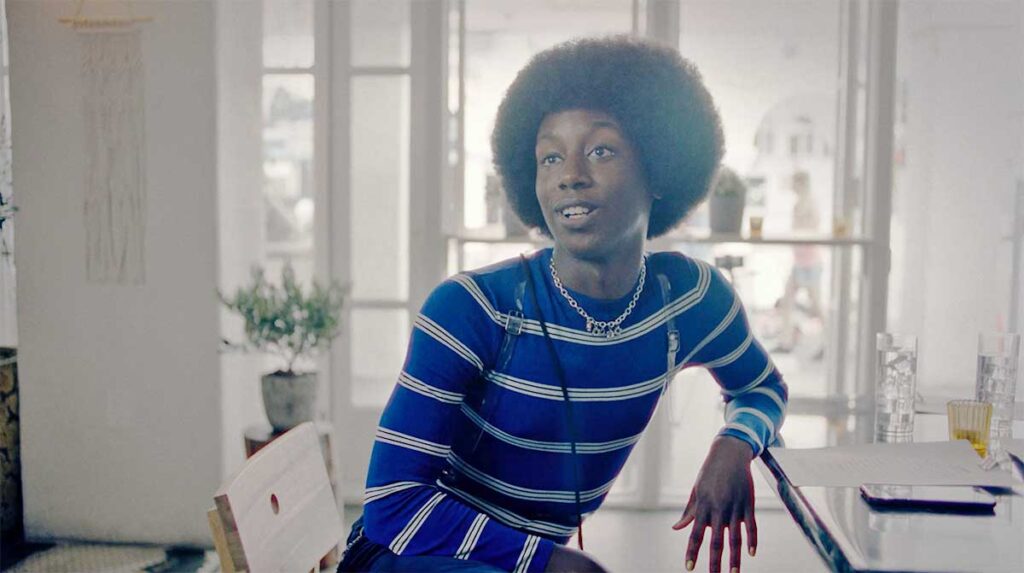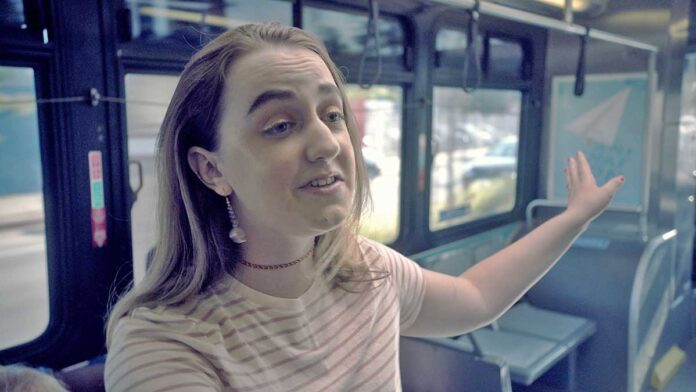“Summertime,” opening July 16 at the Landmark Ritz 5, is a tonic, a jubilant, ebullient film. Affectionate and infectious, it features more than two dozen queer and BIPOC performers — many of them teenagers or college students — reciting their own slam poetry.
Set in Los Angeles in July 2019, “Summertime,” directed by Carlos López Estrada (“Blindspotting”), has a loose structure akin to Richard Linklater’s “Slacker” in that it chronicles various characters and storylines that run parallel and sometimes overlap or intersect. The narrative provides a mixtape of voices expressing their thoughts and feelings as they cope with aspirations and heartbreak. It is a canny approach to storytelling, and it works beautifully. Even when the characters express thoughts about serious topics ranging from economic inequality to discrimination based on race, gender, or sexuality, the film is at once powerful and uplifting.
“Summertime” opens with a guitarist (Olympia Miccio) singing and rollerblading in Venice Beach, only to segue to Tyris (Tyris Winter) at a restaurant complaining about $15 toast. His rant, “Ode to Yelp,” is pointed and amusing, and shows the dynamism of his character, a gay youth who is later revealed to be homeless. As his segment ends, the film follows two characters talking about Britney Spears’ “Work Bitch” being an anthem to worker’s rights as if to identify its social justice politics.

Then two rappers Anewbyss (Bryce Banks) and Rah (Austin Antoine) are seen performing on the street. One of the film’s subplots chronicles Anewbyss and Rah becoming successful, and these endearing characters pop up from time to time — as when Marquesha (Marquesha Babers) sees them filming a music video in the park. Although the film unfolds over the course of a single day, it is missing the point to question the speed of their success.
The magic of “Summertime” is not just the musical-like structure of the film, but the heartfelt emotions on display. One of the highlights is a scene on a bus where Mila (Mila Cuda) is playing a rhyming game with two young kids she is babysitting. When an older lesbian couple suggests some words, and then start kissing, a male patron makes some homophobic remarks, which prompts Mila to launch into “Hey, I’m Gay,” a rousing anthem that gets a round of applause from the riders and an “Amen,” from the bus driver. This scene is so joyous and inspiring that viewers may find themselves cheering, too.
In contrast, “I Want to be Good at Something,” written and performed by Sophia (Maia Mayor), is a beautiful poem about yearning and ambition that has a real poignancy — even if it is performed while she is stalking her ex.
There are other empowering scenes, with “Red Lipstick,” written and performed by Paolina Acuna-Gonzales, a real showstopper. The 18 year-old Paolina envisions the freedom she craves while having lunch with her overprotective mother. This is realized in a fantastic street dance performed by dozens of women in red dresses.
“Summertime” hopscotches all around Los Angeles, from Venice to Silverlake to Koreatown — there is a fun sequence set in a restaurant — to Hollywood. A storyline involving a tagger (Jason Alvarez) generates a montage of city murals, reflecting the images of hope and creativity. One poem, “Home Is…” written and performed by Amaya Blankenship and Bene’t Benton, emphasizes the sense of belonging that so many of the characters desire. There are, arguably, too many characters and themes in “Summertime,” which can make it feel slight or underdeveloped, but it is always winning. The film is like a beachball being bounced around from character to character, and it never hits the ground.
“Summertime” eventually arrives at Smiley’s Burgers, where Gordon (Gordon IP) has to deal with a handful of angry customers before he makes a speech, “Smileys,” that brings the house down. In the audience are Tyris, Sophia and Marquesha, along with Anewbyss and Rah. The latter loan their limo to Gordon and the others who go off into the night. It is at this juncture that the film’s freewheeling style starts to build to its most emotional moment. Marquesha, taking a cue from her therapist Dr. Busan (Sonya Washington), author of the book, “How to ‘Rap’ Battle with Your Demons,” confronts a man who belittled her. It is a mic-dropping moment that illustrates the power of language and the importance of “speaking up and saying the things you feel.” Babers makes viewers feel every emotion in this phenomenal scene.
“Summertime” ends on a note of even greater elegance, with “Clouds,” written and performed by Raul Herrera. This wistful poem about time, pain, and love, will send audiences floating out of the theater buoyed by these lively characters and their individual experiences which are both universal and galvanizing.

